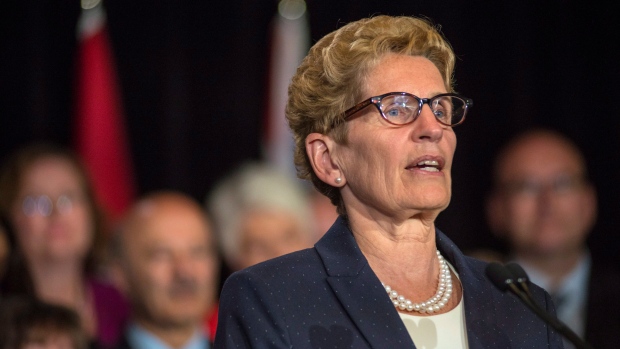Sep 12, 2016
Ontario to remove provincial portion of HST from hydro bills
, The Canadian Press

TORONTO -- It will cost Ontario taxpayers $1 billion a year to subsidize electricity ratepayers under a Liberal government initiative to remove the provincial portion of the harmonized sales tax from hydro bills.
The Liberals announced the plan in Monday's throne speech opening the fall session of the legislature, saying Ontario's eight-per-cent slice of the HST would be taken off electricity bills starting in January, and promising additional relief for rural ratepayers.
"I think it's important to recognize that we're doing something for our remote, rural and northern (electricity) customers as well," said Energy Minister Glenn Thibeault. "They're going to be saving about 20 per cent on all of their bills."
The government said the HST reduction will save the typical Ontario household about $130 a year, and projected additional savings of about $540 a year for some rural electricity customers.
It was just nine months ago that Ontario scrapped the Clean Energy Benefit, which provided a 10-per-cent reduction on all parts of electricity bills, including the HST. That program also saved ratepayers just over $130 a year and cost about $1 billion.
The Canadian Taxpayers Federation said Premier Kathleen Wynne was basically trying to bribe Ontarians with their own money and called it a "cynical" move.
"Our electricity bills grow at an average of eight per cent a year, so if we have a reduction of eight per cent in 2017, what's going to happen in the next year when they don't have an HST to cut," asked CTF Ontario spokeswoman Christine Van Geyn.
NDP Leader Andrea Horwath said it was the Liberals who put the HST on electricity bills in the first place, and she wonders how long their rebate plan will stay in place.
"Six years later the premier says she'll rebate the HST, but people have to wait four more months," said Horwath. "That raises a lot of questions about how long this rebate's going to last and how it will work."
Other initiatives in the throne speech include a commitment to create an additional 100,000 licensed child care spaces for kids aged four and under over five years, starting in 2017.
"We're investing in our child care and we're doing it by setting aside between $600 to $750 million in terms of operating costs, and setting aside $1-to-$3 billion in capital funds to make sure we deliver on our promise," said Indira Naidoo-Harris, the associate minister of education.
The government also promised to put a new emphasis on math skills after half of all Grade 6 students failed to meet the provincial math standard this year, continuing a steady decline in test scores over the past five years.
The throne speech was triggered by Wynne's surprise move last week to prorogue the legislature, saying the government wanted to reset its priorities halfway through its mandate -- with the next election less than two years away.
Wynne had indicated the government would offer some way to mitigate hydro costs for consumers after the Liberals lost a long-held Toronto riding to the Tories in a Sept. 1 byelection.
Auditor general Bonnie Lysyk has said the electricity portion of hydro bills for homes and small businesses rose 70 per cent between 2006 and 2014.
The opposition parties have been on the attack over rising electricity bills, demanding the Liberals stop selling any more shares in Hydro One, the province's transmission utility.
The Liberals say hydro rates increased because Ontario stopped burning coal to generate electricity and because they invested heavily in transmission grid upgrades after years of neglect.
The Progressive Conservatives say rates were driven up higher than necessary by the Liberals' generous, long-term contracts for wind and solar power, while the Green party blames expensive nuclear refurbishments for adding to hydro bills.
The Tories began the sitting on a high note with the swearing-in Monday of their newest member, Raymond Cho, who took Scarborough-Rouge River from the Liberals, giving the Tories a much-sought after seat in Toronto.
The throne speech also repeats the Liberals' plan to introduce a cap-and-trade system in January, which the government predicts will add about $5 a month to home heating bills and about four-cents-a-litre to the price of gasoline.
"Cap-and-trade proceeds will be transparently invested in greenhouse gas reduction projects and incentives that will help Ontario households and businesses further reduce emissions," said an advance text of the speech to be read by Lt.-Gov. Elizabeth Dowdeswell.

